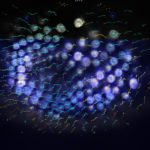Link to Pubmed [PMID] – 41044063
Link to DOI – 10.1038/s41467-025-63895-0
Nat Commun 2025 Oct; 16(1): 8833
Cryo-electron tomography (cryo-ET) enables three-dimensional visualization of biomolecules and cellular components in their near-native state. A key challenge in cryo-ET data analysis is particle picking, often performed by template matching, which relies on cross-correlating tomograms with known structural templates. Current deep learning-based methods improve accuracy but require labor-intensive annotated datasets for supervised training. Here, we present Template Learning, a technique that combines deep learning accuracy with the convenience of training on biomolecular templates via domain randomization. Template Learning automates synthetic dataset generation, modeling molecular crowding, structural variability, and data acquisition variation, thereby reducing or eliminating the need for annotated experimental data. We show that models trained using Template Learning, and optionally fine-tuned with experimental data, outperform those trained solely on annotations. Furthermore, Template Learning provides higher precision and more uniform orientation detection than template matching, particularly for small non-spherical particles. Template Learning software is open-source, Python-based, and GPU/CPU parallelized.

